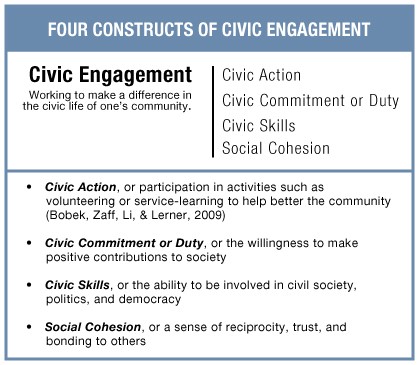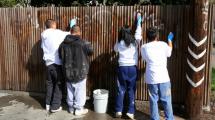Youth who receive special education services under the Individuals with Disabilities Education Act (IDEA 2004) and especially young adults of transition age, should be involved in planning for life after high school as early as possible and no later than age 16. Transition services should stem from the individual youth’s needs and strengths, ensuring that planning takes into account his or her interests, preferences, and desires for the future.
Civic Engagement

Civic engagement involves “working to make a difference in the civic life of one’s community and developing the combination of knowledge, skills, values and motivation to make that difference. It means promoting the quality of life in a community, through both political and non-political processes.”1 Civic engagement includes both paid and unpaid forms of political activism, environmentalism, and community and national service.2 Volunteering, national service, and service-learning are all forms of civic engagement.
According to the 2006 National Civic and Political Health Survey, seven percent of 15- to 25-year-old Americans participated in 10 or more community engagement or political activities within the previous year.3 When compared to their peers who report no civic engagement activities, this group was more likely to be African-American, urban, attend church regularly, from a family with parents who volunteer, a current student (in college or high school), and from college-educated home.4
AmeriCorps (formerly the Corporation for National and Community Service, or CNCS) is a federal agency that sends people power and funding to communities across the country for causes such as disaster response, opioid crisis, and education.
Participation in civic engagement activities can help youth become better informed about current events. For example, according to the 2006 National Civic and Political Health Survey, approximately a quarter of youth who had not participated in civic engagement activities within the last year did not answer any questions regarding current politics correctly.5
Definition and Constructs
Youth civic engagement is defined as working to make a difference in the civic life of one’s community. It also involves developing the combination of knowledge, skills, values, and motivation to make that difference.6 These activities enrich the lives of youths and are socially beneficial to the community. Four interrelated constructs have been identified in the research literature as necessary for civic engagement (see Figure 1).
FIGURE 1: FOUR CONSTRUCTS OF CIVIC ENGAGEMENT

Volunteering is only one form of civic engagement included, as defined above, in the construct of civic action and civic commitment or duty, but research has also shown a connection between youth who volunteer and other forms of youth civic engagement. Findings suggest that “among youth, volunteering plays a valuable role in shaping how youth learn to interact with their community and develop the skills, values, and sense of empowerment necessary to become active citizens.”7
While many youth volunteer, most young people do not see a connection between volunteering and political engagement or activism. In the 2006 National Civic and Political Health Survey, the majority of young people said that they volunteered in order to help others, not to address a social or political problem. Only six percent of youth believed that their volunteering was a means to address social or political problems.8
Another possible form of civic action and civic commitment and duty is service-learning. According to the American Psychological Association,9 service-learning and civic engagement can be related but are not the same thing. Service-learning does not have to include a civic dimension and all forms of civic engagement are not service-learning. Civic engagement is a broader concept that may encompass, but is not limited to, service-learning. Service-learning differs from community service or volunteerism in two distinct ways:
- The service activity is integrated with academic curriculum and content.
- Students engage in reflection activities after their service experience and apply their learning in real-life activities.10
Resources
Character and Civic Education
The U.S. Department of Education’s Office of Safe and Drug Free Schools’ Character and Civic Education group administers various programs in character and civics education. These programs include providing financial assistance for character and citizenship education activities in elementary and secondary schools and institutions of higher education, and reporting on issues and programs, disseminating information, and providing technical assistance to state agencies and state and local correctional institutions.
AmeriCorps (Formerly the Corporation for National and Community Service, CNCS)
AmeriCorps was created (as CNCS) as an independent agency of the United States government by the National and Community Service Trust Act of 1993. AmeriCorps brings people together to tackle the country’s most pressing challenges, through national service and volunteering.
Helping Your Child Become a Responsible Citizen (PDF, 43 Pages)
This resource from the U.S. Department of Education provides information about the values and skills that contribute to character and good citizenship, including guidance on what parents can do to help their elementary-, middle-, and high school-aged children develop strong character.
How to Plan and Implement an Anti-Racist Service Project
The YSA Knowledge Center, under a grant from the Serve.gov, provides downloadable resources and video trainings to take service projects from idea to action through the project planning steps of investigation, preparation and planning, action, reflection, and demonstration/celebration.
References
1 Erlich, 2000
2 Michelsen, Zaff, & Hair, 2002
3 Lopez, Levine, Both, Kiesa, Kirby, & Marcelo, 2006
4 Dávila & Mora, 2007
5 Dávila & Mora, 2007
6 Erlich, 2000
7 AmeriCorps, 2005
8 Lopez, Levine, Both, Kiesa, Kirby, & Marcelo, 2006
9 American Psychological Association, 2010
10 College of Southern Maryland, 2010
Other Resources on this Topic
Agencies
Announcements
Collaboration Profiles
Feature Articles
Internships
Programs
Publications
Resources
Technical Assistance
Tools & Guides
Websites
Youth Topics
Youth Briefs
Research links early leadership with increased self-efficacy and suggests that leadership can help youth to develop decision making and interpersonal skills that support successes in the workforce and adulthood. In addition, young leaders tend to be more involved in their communities, and have lower dropout rates than their peers. Youth leaders also show considerable benefits for their communities, providing valuable insight into the needs and interests of young people
Statistics reflecting the number of youth suffering from mental health, substance abuse, and co-occurring disorders highlight the necessity for schools, families, support staff, and communities to work together to develop targeted, coordinated, and comprehensive transition plans for young people with a history of mental health needs and/or substance abuse.
Nearly 30,000 youth aged out of foster care in Fiscal Year 2009, which represents nine percent of the young people involved in the foster care system that year. This transition can be challenging for youth, especially youth who have grown up in the child welfare system.
Research has demonstrated that as many as one in five children/youth have a diagnosable mental health disorder. Read about how coordination between public service agencies can improve treatment for these youth.
Civic engagement has the potential to empower young adults, increase their self-determination, and give them the skills and self-confidence they need to enter the workforce. Read about one youth’s experience in AmeriCorps National Civilian Community Corps (NCCC).
While youth are more likely to register to vote in school, only about 1 in 10 of them does.
DOWNLOAD: VOTER REGISTRATION AMONG YOUNG PEOPLE IN MIDTERM ELECTIONS






